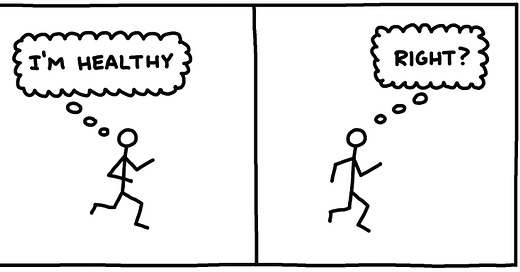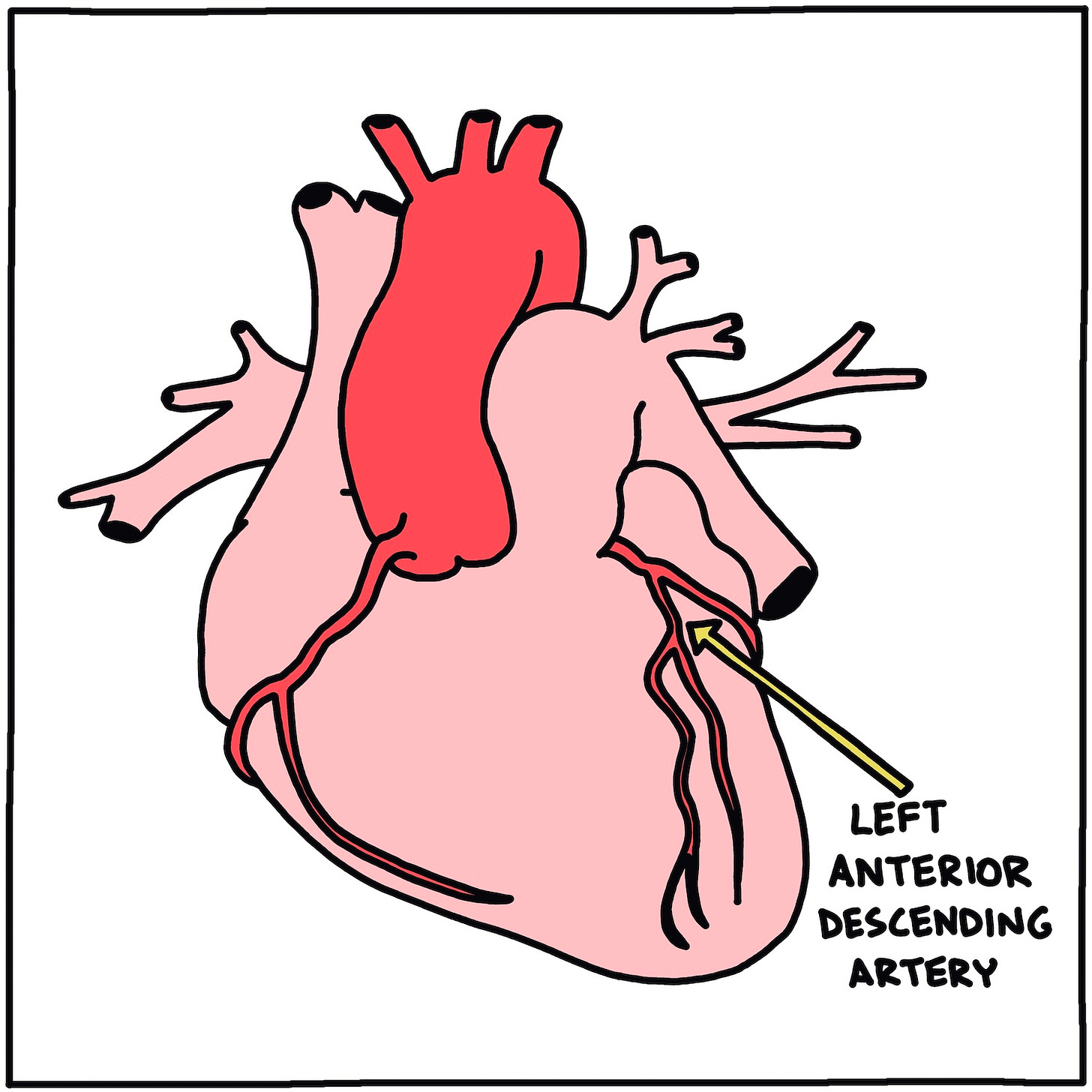My mom was the first to recommend it, but it was the close calls of a few friends that finally sold me on it. I watched the ceiling as I slid into the CT scan machine, and I thought about the “seven touches” principle of marketing, in which we need seven interactions with a brand or product to actually make a purchase or act upon a call to action—social media posts, ads, word-of-mouth mentions, et cetera.
And that if one of those “touches” is an otherwise healthy friend almost dying, maybe you need fewer touches? That’s what got me in the door at the Montana Imaging Center on a Friday this past fall, to get my heart scanned for calcified plaque in my arteries.
I’m 45, about to turn 46 this winter, and I like to think I’m pretty healthy—I try to run 20-30 miles most weeks, bike whenever I can, have been sober for 23 years, haven’t eaten meat in 18 years, and eat plenty of fiber. My mother is a retired nurse practitioner, and also still my mom, and she had told me a year ago that I should go in and get a coronary calcium scan. Since I am still her son and also a Very Busy Person, I pooh-poohed it, saying I was pretty sure my heart would be in good shape, blah blah blah lifestyle, I’m OK, Mom.
And then I got an email from endurance legend Buzz Burrell a few days before Christmas 2023, titled “The Widowmaker is gone.” In it, Buzz detailed a recent heart scare he’d had, at age 72. He’d been experiencing "chest constriction and shortness of breath upon exercise,” and after numerous doctor visits over the course of 10 weeks, he’d finally walked into the emergency room, where tests showed a 95 percent blockage in his left anterior descending artery, which in an anatomical visualization, is located here:
If a cross-section of the left anterior descending artery were a donut, zero blockage and 95 percent blockage might look something like this:
Which, as far as my understanding of the circulatory system goes, is kind of a big problem. The cardiologist kept Buzz in the hospital overnight and performed a coronary angioplasty with a stent the next day to open up Buzz’s artery. That was Thursday, and Buzz hiked for two hours on Saturday, and went swing dancing on Saturday night.
A partial list of bullets from Buzz’s email:
EKG: I had multiple EKG’s; each of this famous test showed I was fine.
Blood Test: I had numerous blood tests, all of which were within the Normal range. BP 114/60, HR 52, etc.
Transthoracic EchoCardiogram (ultrasound) on 12/4: My heart looked normal!
CT heart coronary angiogram (12/13 in ER): 95% blockage!
Which is a bit alarming, of course, but what really grabbed my attention was a link Buzz shared in his email: A 2014 study taking 50 male marathon runners who had run at least one marathon every year for 25 years, matching them up with 50 sedentary men of similar body weight, and comparing their coronary calcium, found that the marathon runners had 58 percent MORE calcium in their arteries. Which at this point is old news, but was news to me, a person who believes that lots of cardiovascular exercise is good for me, full stop.
The following June, my friend Brian, then 53, a marathoner and multi-Ironman finisher, a little over a year out from running the Keys 100 ultramarathon, had a heart attack—actually, sudden cardiac death—while he was on a bike ride. (The difference between sudden cardiac death and a heart attack/cardiac arrest is the patient dies.) Three bystanders performed CPR on Brian until paramedics arrived. They defibrillated Brian twice there, and once in the ambulance, and a fourth time in the ER, to bring him back to life.
He survived. Brian, just like Buzz, had 95 percent blockage in his left anterior descending artery, which was cleared by cardiac catheterization. In a social media post, he wrote: “I had symptoms that were masked as indigestion, and all the relative numbers (heart rate, cholesterol, etc.) never pointed to an impending cardiac event. There is a strong family history as both my father and grandfather died of heart attacks, and it's difficult to outrun genetics. My strong cardiovascular health, when combined with the speed of the response, was a deciding factor in my survival.”
A couple weeks later, my friend Scott, 43, stopped by, and since we’re in our 40s, we eventually started talking about health issues, and he had a story too. He’d been having occasional chest pain while exercising, which he assumed was work stress and anxiety, but while leading a bike ride in Zion National Park, he’d had to stop because of the pain, and he finally scheduled a doctor appointment.
The pain in his chest was, just like Buzz and Brian, blockage in the left anterior descending artery. Ninety percent blocked, which sounds better than “95 percent blockage,” but if the mean diameter of the Left Anterior Descending Artery is 2.26 millimeters, 90 percent blockage means blood is squeezing through a .4 square millimeter hole, and 95 percent has a .2-square-millimeter hole to work with. How big is that? If you take a .7 mm mechanical pencil and click out the lead a little bit, that’s the size of the hole in a 90 percent blocked Left Anterior Descending Artery. The smallest mechanical pencil lead size you can find in most office supply stores, .5 mm, is 95 percent blockage.
I had an appointment coming up with a new general practitioner since my old one had left, and I mentioned the coronary calcium scan. My new doctor said we should do a lipid panel and see if I had high enough cholesterol numbers that he could recommend the scan, and then my insurance would likely pay for it. The panel came back normal, so not enough risk for him to recommend it. But my mom reminded me that both she and my uncle both had normal cholesterol, and both their calcium scores were high.
Finally l just googled the damn test, and the cash price at the Montana Imaging Center, a 7-minute bike ride from my house, was $125. Which is less than I pay for a pair of trail running shoes, so I just made an appointment.
I did not meet any of the risk factors on the Montana Imaging Center website, which are, for men ages 35-70 and women ages 40-70: Family history of heart disease, smoking, diabetes, high cholesterol, high blood pressure, overweight. So was I being overly cautious? Again, the study of marathon runners, and Buzz’s advice from this article on UltraRunning.com: “You’re an athlete, so you need your doctor to re-calibrate for who you are. Three days before my dramatic angiogram, I biked 53 miles, because at 95% blockage I could still do more than most other 72-year-old people who can’t make it up the stairs to the doctor’s office. Our healthy appearance can deceive doctors who then tell us to get out of their office to make room for someone who is actually sick.”
Between the waiting room at the Montana Imaging Center, the actual test in the CT scanner, then waiting for my results, and then discussing my results with Dr. Tim McCue, the radiologist in chief, the entire thing took 15 minutes. I had a coronary calcium score of zero, which means at this point, less than five percent risk for heart disease.
Dr. McCue says he looks at coronary calcium scans from people living all kinds of lifestyles—people on the Carnivore Diet, people with cholesterol risk factors, people with family history of heart disease, and endurance athletes, who, like myself, might assume that things are fine because we can run a bunch of miles without stopping and generally feel fine. He says he recommends endurance athletes get a scan at age 35, just to have a baseline understanding of what’s going on. “In my mind, in the sports medicine world, it seems 35 is a turning point when things start to not go downhill, but when things start to change a little,” he says.
“It seems like everybody, including myself, have had friends or older colleagues that have had heart attacks that didn't make any sense,” McCue says. “That's where I think the calcium scoring is helpful because it can give people an idea of if they're doing everything right and their lipid panel or other labs are marginal, then you can still look at things.”
I’m not a doctor, or even a great science sports writer like Alex Hutchinson. And I’m definitely not trying to become a wellness influencer. But I think doing a super-easy test that can keep you from a really bad surprise (the worst surprise?) might be a good idea.
“There's lifestyle, there's diet, there's all this stuff that we've traditionally known to try to reduce our risk of heart disease, but you can't pick your parents," McCue says. "There are genetic factors involved. Traditionally, we've been able to look at lipid profiles and different kinds of labs. Those give you an idea of what your risk is. You're high risk, or low risk, but there's no definitive data. The cardiac calcium score looks for calcium on the outside of the blood vessels that forms when you have atherosclerosis inside that vessel. It's picture proof of if there could be something going on underneath it. I think if anything, it can give you peace of mind, but in your 40s, then you can get at least a baseline of where you are.”
--
If you enjoyed this piece, please consider supporting my work.









Thanks for this important post about cardiac health. I would add, it's wise and recommended for anyone with a family history of parents or grandparents who died of a "heart attack," but you're not sure exactly what the cardiac issue was, to get tested. CT scans also detect aortic aneurysms, which otherwise go undetected and often arefatal. They can be fixed with surgery. I wrote a profile on longtime ultrarunner Monica Ochs who had open-heart surgery to get an aneurysm repaired, and she found out about only because she happened to get a CT scan—something she pushed for. She told me, "The only reason I found it is it was an incidental finding on a CT scan I had. I had high cholesterol genetically, so my doctor wanted to put me on statins, and I said, ‘Let me check my calcium score and see if my arteries are truly being clogged.’ So I went into [the scan] for that and had an incidental finding of an ascending aortic aneurysm.” As for difference between heart attack and sudden cardiac arrest, my understanding is a heart attack involves a blockage, whereas sudden cardiac arrest is an electrical malfunction. With a heart attack, you have hours to get help; with sudden cardiac arrest, you have only a few minutes, and it's essential to have access to an AED to treat sudden cardiac arrest. Learn CPR/AED and know where AEDs are located where you live!
I'm going in for the test in the morning. I'm 63 and have been an endurance athlete for the last 23 years. My cholesterol is high, HDL of course which is great, but also LDL but my doctor always says, "You run enough to not worry about it." My Dad had a stent put in several years ago. It'll be interesting to learn my risk.